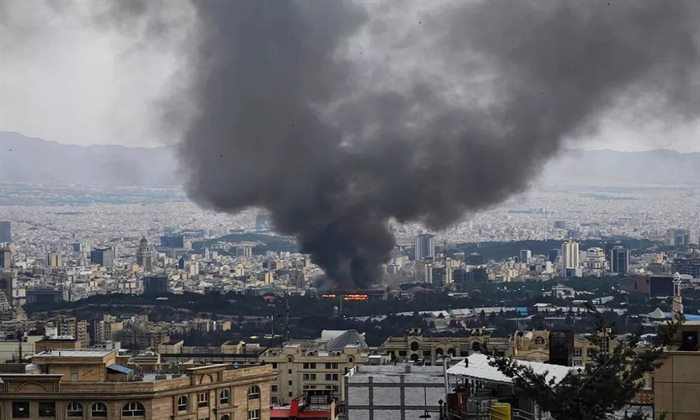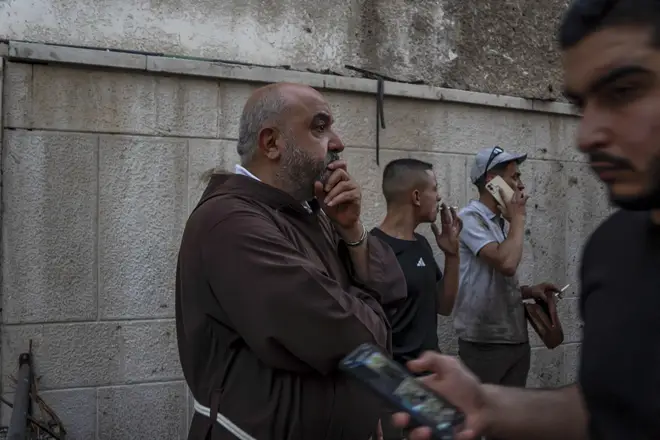In a dramatic escalation of regional hostilities, Iran on Monday evening, June 23, 2025, launched a missile offensive targeting U.S. military installations located in Qatar and Iraq, in retaliation for U.S. airstrikes on Iranian nuclear sites the day before.
According to a statement from Tehran, the Islamic Revolutionary Guard Corps (IRGC) initiated the strike under the orders of the Supreme National Security Council, directing long-range missiles at al-Udeid Air Base in Qatar—America’s largest military presence in the region. The base hosts approximately 10,000 U.S. personnel and acts as a strategic hub for operations across West Asia.
“This was a measured response to the unlawful aggression on our nuclear infrastructure,” read the IRGC statement, asserting Iran’s intent to defend its territorial integrity at any cost.
Qatar Responds Swiftly, Intercepts Attacks
The Qatari Defence Ministry confirmed the interception of the missiles, noting that no fatalities or injuries were recorded. While loud explosions were heard across central Doha around 7:40 PM, the country’s air defense systems successfully neutralized incoming threats, and public life experienced minimal disruption.
Shortly after the incident, Qatar’s Foreign Ministry announced the temporary closure of national airspace, a move described as precautionary to ensure civilian safety. The U.S. Embassy in Doha had earlier advised American nationals to seek shelter, signaling heightened security awareness prior to the strike.
“Qatar considers this act a grave violation of its sovereignty and international law,” said Majed Al Ansari, a spokesperson for the Qatari Foreign Ministry. “We reserve the right to respond appropriately within the framework of international legal norms.”
Ain al-Assad Base in Iraq Also Targeted
In a parallel offensive, Iran also fired missiles at the Ain al-Assad base in western Iraq, which hosts U.S. forces. Iraqi defense sources confirmed the strike but provided no immediate information on potential damage or casualties. This marks a significant expansion of the conflict zone, dragging another key regional player into the fallout.
Global Reactions and Regional Fallout
The Iranian response came just hours after U.S. President Donald Trump announced via social media that American operations had “completely destroyed” Iran’s nuclear infrastructure on Sunday, June 22, 2025. However, the White House has yet to officially address Iran’s retaliation.
Iranian President Masoud Pezeshkian commented shortly before the strike, stating, “We did not start this war, but we will not let any attack on our homeland go unanswered.”
Meanwhile, the Indian Embassy in Qatar issued an advisory urging Indian citizens to stay indoors and monitor local updates. Similar alerts were seen in Bahrain, which suspended air travel and moved government operations online as precautionary measures.
“Due to ongoing regional developments, several embassy staff are now working remotely,” the U.S. Embassy in Manama noted on social media.
Israeli Involvement Adds Fuel to Fire
Adding another layer to the already volatile situation, Israel launched its own airstrikes on Iranian territory earlier in the day, reportedly targeting the Evin Prison in Tehran, key military infrastructure, and roads around Iran’s Fordow nuclear facility. Israel stated these strikes were a response to recent missile and drone attacks launched from Iran.
READ MORE: 5 Key Iranian Regime Institutions Targeted by Israel in Recent Strikes
Tehran’s state media reported that its own missiles reached Tel Aviv and Haifa, while explosions were also noted in Jerusalem. Despite the widespread alarms, Israeli emergency services reported no casualties as of Monday night.
Iran-Russia Talks Signal Diplomatic Undertones
Just before the attack, Iran’s Foreign Minister Abbas Araghchi met with Russian President Vladimir Putin in Moscow, emphasizing the strategic bond between Tehran and Moscow. Araghchi reiterated Iran’s intent to coordinate closely with Russia on regional stability and nuclear diplomacy.
Conclusion: A New Phase of Confrontation?
The rapid series of military responses across multiple nations signals a dangerously escalating conflict in the Middle East, with potential global implications. While Qatar and Bahrain have managed to contain immediate threats through interception and civilian protection measures, the next steps by the U.S. and its allies, as well as Iran’s evolving strategy, remain closely watched.
As the situation unfolds, diplomatic channels may play a critical role in preventing a full-scale regional war—but the window for de-escalation is rapidly narrowing.



